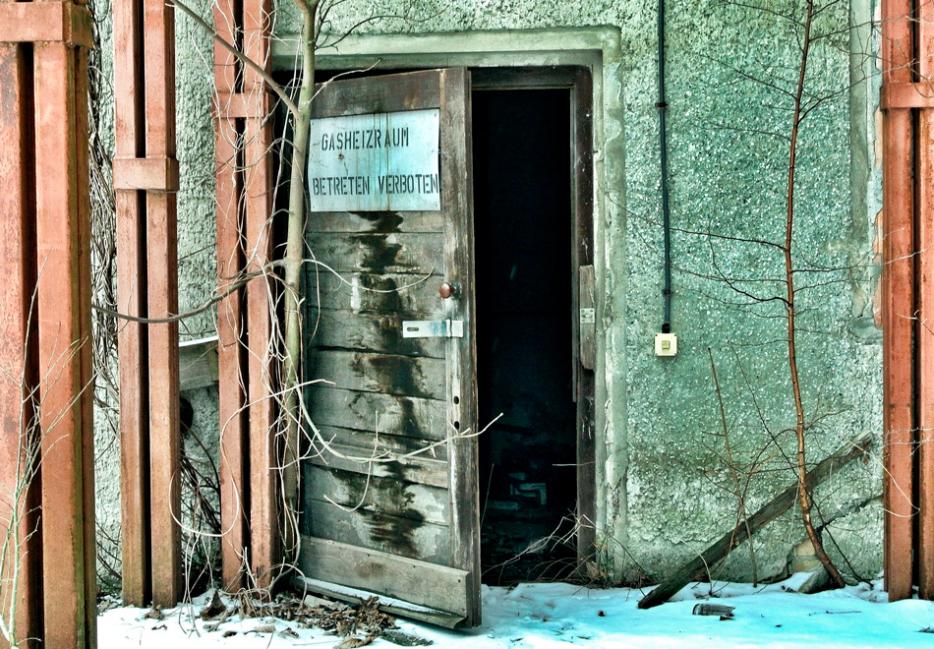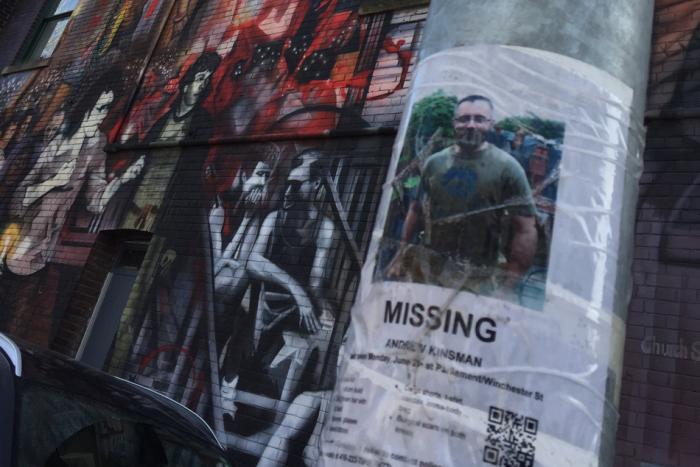The first person who told me Berlin was an interior city was a stranger, someone I met at a party for someone else I barely knew. He'd recently visited Berlin and, perhaps like everyone who's recently visited Berlin—certainly like me, now—he couldn't shut up about it. “It doesn't look like much,” he told me. “It's a lot of brutalism and cement. But if you find the right doors to go through, it's incredible. All the good stuff is inside, or secret, or hidden. You just have to know where it is.”
Based on my memory of who he was—a lithe, handsome, and very young man from some non-U.S. country I can’t recall—he was probably thinking of places like Berghain, the legendary club. I walked past Berghain in the daylight when I was in Berlin; it's just on the other side of the parking lot for a big-box store called Metro that looks exactly like an IKEA. In DC, where I grew up, it would be utterly believable as a government building—the offices of functionaries in some smallish department, maybe Fish and Wildlife Service tech support. Inside, if you can get inside, it's reportedly a techno bacchanal, a wonderland of drugs and music and sex. But I'm a fat American in my late 30s. I did not try to get inside.
Still, the claim about Berlin seems to hold, whether you're looking for the fabled club inside a concrete office block next to the knock-off IKEA, or something a little more staid. Berlin is a speakeasy city, full of secret doors to close against whatever regime has the latest boot on its neck. One night our friends took us into a shopping mall in the neighborhood where we were staying, where they lived. We walked through the mall, past the GameStop and the McDonald's, to the parking garage elevators, and took them to the top floor. When the elevator disgorged us we walked up the ramp to the roof of the parking garage. Up there, perched above five floors of shopping and parking and a movie theater, was a vast bar patio that looked like the set for a high school production of South Pacific crossed with Beyond Thunderdome. You never would have known it was there, if you didn't know.
Inside the bar, we sat on mismatched chairs under a disco ball, in a fug of smoke, and watched amateur fireworks going up outside. Some of the secret spaces of the city are orgies, but some of them are living rooms.
*
It's not actually true that Berlin doesn't look like much from the outside. Granted, it doesn't look like an American's idea of a picturesque European city—but then again, sometimes it does. In Mitte, the center city, where most of the tourist stuff lives, there's a smattering of old-world architecture: the museums, the cathedral, the sub-neighborhood known as Alt-Berlin (“Old Berlin”). These look the way you'd imagine them to look: domes and crenellations, cobblestones and copper. Such spaces exist in Berlin, but the city has had many lives since then. There are a few spots that remain unscathed, and many more where bark has grown over the scars.
Even in the beautiful spaces, though, there are inward folds: places held cradled in secrecy, places that reward investigation even when the surface view might seem to be enough. In Alt-Berlin, between the old town hall and the river Spree, in the shadow of a 13th-century church, we found an odd storefront with its displays packed full of deliberately arranged bric-a-brac. The window was stenciled “Surrealische Museum fur Industrielle Objekte,” and the sign on the door said “Next Entrance.” We looked around for the next entrance for five minutes, before realizing it actually said “Next Entrance 4 p.m.”
This was the door of Designpanoptikum, which is mostly a warren of basement rooms filled with surreal assemblages of defunct technology. When we stepped inside, owner and artist Vlad Korneev explained his theories about form and function in rapid-fire Russian-accented English, then left us alone to wander among the dummies and cameras and lights and pipes and stripped-down bits of metal that used to be something else, that used to work. The basement hallway is lined with photos of a younger Korneev in the nude, with different objects on his head. The whole thing is unnerving and beautiful, a fantasy taxidermy of machines. I think most people would hate it, but then again, they wouldn't know it was there.
*
Hermann Hesse's Steppenwolf never says it's set in Berlin, and it probably isn't, but it could be. It's a German city full of 1920s dance halls, so why not? When I was younger, I was fascinated by Steppenwolf, largely because much of the book is devoted to the minute examination of a kind of psyche optimized to appeal to teens who think they're special. In particular, though, the image that nailed itself to the wall of my mind was the door with a flickering sign: Magic theater, entrance not for everybody. For madmen only. “I was freezing and walked on following that track in my dreams,” says narrator Harry Haller, “longing too for that doorway to an enchanted theater, which was for madmen only. Meanwhile I had reached the market place, where there is never a lack of evening entertainments. At every other step were placards and posters with their various attractions...But none of these was for me. They were for 'everybody,' for those normal persons whom I saw crowding every entrance. In spite of that my sadness was a little lightened. I had had a greeting from another world, and a few dancing, colored letters had played upon my soul and sounded its secret strings.”
I suppose that's what I've been looking for all my life: magic theaters for madmen only. The “track in my dreams”—at least the dreams I remember—has always led through secret doors and hidden passages, cluttered museums and subterranean warrens of interconnected rooms. I've sought out places that mimic that fantasy: places that, behind an unremarkable facade, spin out into a mazy web of curious chambers. You can find these, if you make a hobby of it: the House on the Rock in Spring Green, Wisconsin; Meow Wolf in Santa Fe; Sleep No More here in New York, at least in the early days. There are others. They aren't really secret, and some of them are very popular, but they are definitely not for everybody.
At one point I suspect I meant “everybody” in the same sneering way that Harry Haller uses it: as if “those normal persons” who don't seek out hidden corridors were inferior for being satisfied with what the world will readily provide. As if being delighted by what's available on the surface—external beauty, accessible value—meant you were depthless and obvious, incapable of profundity. There was a time when that thought would have comforted me. Now, it's simply an acknowledgment: not everyone's dreams are a labyrinth of secret rooms spiraling into the earth. It is possible, admirable, probably even preferable to live outside under the sky.
But I am only interested in theaters for madmen. Berlin first sparked my curiosity, in fact, because it housed what seemed like a perfect magic theater, a convoluted playground called Peristal Singum. That closed years before I managed to visit, a fact that still guts me. If there's a word for keen nostalgia for a place you've never been, I'm sure it's German.
Luckily, Berlin is a patchwork of magic theaters: carnival spaces too cool for the likes of me, but also strange art and cozy nooks and just plain odd delights. A few blocks from the place we were staying is a building, a former factory, that's not especially notable aside from being pink, but which turns out to house a large indoor campground full of cabins and vintage caravans and fake trees. Perfect cocktail bars are posted up behind forbidding unmarked doors, where you have to ring the bell and wait to get in. At the end of a graffiti-lichened alleyway in the otherwise tony Hackesher Markt, down a narrow spiral staircase, we found Monsterkabinett, a sort of immersive art project in the form of a murky basement filled with lurching, clanking steampunk automatons. Our tour through the space was frantic, clamorous, and possibly genuinely dangerous (it’s hard to tell the difference between a barely-controlled spider robot that’s attacking you and a barely-controlled spider robot that’s pretending to attack you, after all). Above, people shopped at the Nike store and the H&M and went to the movies. How could I not be enchanted?
*
I used to think that being in love was a matter of fortifications. I took seriously, though incorrectly, the Rilke advice read at my wedding: that marriage means “each partner appoints the other to be the guardian of his solitude.” If someone were going to stay with you, I'd long since decided, it was important that they be shielded from whatever about you was difficult to love. This included almost everything: need and desire, grief and grievance, the things I was ashamed of and the reasons for that shame. If Bluebeard were a woman, the locked room would still be full of girls' bodies, but they would all be the same girl.
Even when I shared a home, or a marriage, I always kept my own closet, blankets, bank account, toothpaste, car—sometimes my own bedroom. I joked that my ideal living situation would be like Frida Kahlo and Diego Rivera: two houses joined by a bridge. There's nothing wrong with any of this, of course, if you're doing it in the spirit of getting the solitude you need. But I was more interested in bricking up anything I thought might be unacceptable: messes and debts and damage and inconvenient physicality. And it worked, insofar as my vigilant quarantine mostly went unnoticed. A wall is a comfort, when you're not the one building or policing it, when you're not the one blocked in. A wall means you don't have to worry about what's on the other side.
The remainder of the wall in Berlin, incidentally, is an anti-war art gallery now—nearly a mile of it, jutting up confused and purposeless but embellished with messages of peace. A city with Berlin's history, one must assume, has a different relationship with walls than a space that's never been split. Once you've built your identity on a wall, openness is vertiginous: a joyful vertigo, but vulnerable. It's more comfortable for walls to have gaps and openings and compartments, a balance of freedom and involution, not barriers but hiding places. If you can't tear it all the way down, you can still pass through it. A wall that is also a gallery. A gallery that is also a plea to not be hurt again.
*
The word I immediately used for Berlin was “haimish”—a Yiddish word, which is ironic, since Berlin was the seat of the Third Reich. (But also non-ironic, since Berlin sports a full city-block Holocaust memorial the likes of which you would never see in the United States. Imagine 200,000 square feet of prime Manhattan real estate given over to memorializing Jews. Yes, that's all of Manhattan, but I mean explicitly.) What it means is “homey”: comfortable, easeful, familiar. This sense of haimishness comes, I think, from the fact that Berlin's inward tendency feels natural to me: the city and I both curl the same way. I don't know if a person who lives on the surface would feel at home in Berlin, or if she would feel shut out. For me, it feels like a place you could make a life.
In fact, my partner almost moved to Berlin just before we met. Like me, he fell in love with it immediately, even though—or probably because—its riches aren't immediately apparent. Also like me at the time, he was trying to shake the inertia of a long and bricked-up relationship. Moving to New York, the city of open secrets, proved to be much easier—a friend in Brooklyn happened to need a roommate—but Berlin plans were well underway when the offer came through. When he first told me this, it felt minorly miraculous, a tragedy narrowly averted; we hadn't known each other that long, but I already could tell I would have been mysteriously bereft if I'd gotten to New York and he wasn't here. If I'd known more about Berlin at the time, though, I might have also found it reassuring.
But I didn't, and so I've made him prove his magic-theater-hunting bona fides over and over—even after he told me his dreams were mostly underground corridors, too. Germany was the first overseas trip we'd taken in our four years together, but we'd already traveled to New Mexico and Baltimore and Wisconsin and the nowhere middle of Florida to seek out some of the hidden treasures in the U.S. I suppose it's become kind of a litmus test for me: Will this person accompany me across the country to a town we have no other interest in, simply because there are weird secret rooms that I want to see inside? I need to know they have a commitment to secret rooms.
*
I loved Berlin because I loved Berlin, but I also got engaged there. He brought me coffee and pastries and roses and then proposed in the living room of the apartment we were subletting for the week, a much-too-large-for-us prewar palace above a Vietnamese takeout in Neukölln. In some ways I suppose it was strange to make such a certain choice about our future in someone else's home, a place we'll never enter again, but it made sense in the end. We were rattling around in that apartment; it was so large compared to our Brooklyn one-bedroom, in fact, that there were rooms we never entered at all. We could have had so much solitude there, so much territory, so much privacy. Instead we'd made a cozy kingdom of the living room, a shared space of companionable quietude. We are always building sheltered rooms together.
I don't know a way to tell for sure if you will be with someone forever. But I think I know, now, the way to tell if you're able to be with them honestly. It has to do with seeking out magic theaters together, sometimes—but more than that, it has to do with constructing them, putting up walls with each other instead of against. The problem with a wall is not the building but the barrier. A wall can be part of a room. It can brace a bridge. It can hold a door.
That's love for me now: not a fortress, not an open sky, but a house. A series of rooms we build together: old structures and new additions, basements and breezeways, secret passages accessed with a code word, doors that are sometimes open and sometimes closed. Cigarette smoke and disco balls, maladjusted metal monsters, broken gadgets arranged like art. Not for everybody—not something everyone would want. But if someone rings the bell, you can let them in.
Sometimes marriage means you change your last name, especially if that name originally came from the person you married before. Well, I've grown to like mine, and I'm keeping it: Zimmerman. German, “builder of rooms.”
*
When Harry Haller finally makes his way inside the magic theater, he encounters—what else?—himself. That's what's always been inside the rooms and behind the walls, after all. Even the drive to hunt for secret doors, says Harry's host Pablo, is in fact a drive to look within. “You have a longing to forsake this world and its reality and to penetrate to a reality more native to you, to a world beyond time,” he says. “You know, of course, where this other world lies hidden. It is the world of your own soul that you seek. Only within yourself exists that other reality for which you long.”
You knew that too, of course. A subterranean warren of secret rooms—what did you think it meant? Predictable, egotistical: the desire to find hidden places that are all just ways back in to the human heart. But like any way in to the human heart, it gets more interesting when someone else is there with you.
Places feel like home when we curl the same, a hand around a hand. It's a sort of cosmological resonance: as without, so within. People feel like home for similar reasons: when they understand the direction that you turn away, and why, and what it means to follow the track in your dreams through miles of underground rooms. Standing hand in hand in a secret place in a secretive city, not guarding each other's solitude but cradling it: a spiral like a nautilus going all the way into the earth.






